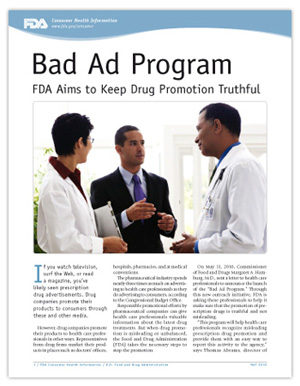Bad Ad Program: FDA Aims to Keep Drug Promotion Truthful
On This Page:
- Better Information About Prescription Drugs
- Promotional Settings
- Recognizing and Reporting
- Consumer Reporting
If you watch television, surf the Web, or read a magazine, you’ve likely seen prescription drug advertisements. Drug companies promote their products to consumers through these and other media.
However, drug companies promote their products to health care professionals in other ways. Representatives from drug firms market their products in places such as doctors’ offices, hospitals, pharmacies, and at medical conventions.
The pharmaceutical industry spends nearly three times as much on advertising to health care professionals as they do advertising to consumers, according to the Congressional Budget Office.
Responsible promotional efforts by pharmaceutical companies can give health care professionals valuable information about the latest drug treatments. But when drug promotion is misleading or unbalanced, the Food and Drug Administration (FDA) takes the necessary steps to stop the promotion.
On May 11, 2010, Commissioner of Food and Drugs Margaret A. Hamburg, M.D., sent a letter to health care professionals to announce the launch of the “Bad Ad Program.” Through this new outreach initiative, FDA is asking these professionals to help it make sure that the promotion of prescription drugs is truthful and not misleading.
“This program will help health care professionals recognize misleading prescription drug promotion and provide them with an easy way to report this activity to the agency,” says Thomas Abrams, director of FDA’s Division of Drug Marketing, Advertising, and Communications (DDMAC).
Better Information About Prescription Drugs
“We’ve seen promotion that is accurate and balanced and provides good and useful information to doctors and patients,” says Michael Sauers, a group leader in DDMAC. “Having complete and good information will help doctors in the decisions they need to make about treatment options for their patients.”
But not all promotions are accurate and balanced.
“One of the biggest problems is that sometimes the drug reps promote a drug’s effectiveness while playing down the risks,” says Robert Dean, also a group leader in DDMAC. “One tactic is to try to disconnect the known risk from their specific drug by claiming that the risk is seen with other competing products, but not their drug. Or they may claim that the risks of their drug are less likely to occur than shown in clinical trials.”
Another problem is overstating the effectiveness of a drug, for example, by saying the drug works in as little as three days, when the majority of patients in studies took three months to show results.
Promotional Settings
FDA’s DDMAC aims to ensure that all prescription drug promotion is truthful, balanced, and accurately communicated. Promotions it regulates include
- sales representative presentations
- speaker program presentations
- TV and radio advertisements
- written or printed drug promotional materials
Traditionally, DDMAC has monitored prescription drug promotions through
- review of promotional materials submitted by companies
- investigation of complaints about drug promotions
- close observation (surveillance) of drug promotions at large medical conventions
- review of promotion using the Internet
While these efforts are effective, FDA’s ability to monitor promotional activities that occur in settings such as doctors’ offices, local dinner programs, and promotional speaker programs is limited.
“Companies send us their sales aids—the booklets and campaign materials for their drug that the reps are supposed to use in the field when they talk with doctors—and we review those materials,” says Dean. “But we have limited access to the promotional activities in these settings. That’s why we’re asking health care professionals to partner with us in our efforts to stop misleading prescription drug promotion.”
Recognizing and Reporting
Through the Bad Ad Program, FDA is asking health care professionals to recognize and report.
- Recognize: Be aware of the many drug advertisements and promotions that they see every day and learn how to distinguish misleading or illegal information.
- Report: Help FDA stop violations by reporting activities and messages that may be false or misleading.
FDA will evaluate all the reports it receives. If FDA finds any violations of the regulations, it will take action to stop the misleading promotions.
FDA plans to conduct the Bad Ad Program in three phases. In phase 1, FDA will exhibit the program at medical conferences and partner with medical societies to distribute educational materials. Eight major medical conferences are on FDA’s schedule from May through September 2010. In phases 2 and 3, FDA will expand its collaborative efforts and update its educational materials.
Consumer Reporting
The Bad Ad Program is aimed at health care professionals. FDA has another program to educate consumers about what is and isn’t appropriate in prescription drug advertising aimed at them. (See FDA’s Online Guide for Consumers.)
If you think that a prescription drug ad violates the law by being false, misleading, or lacking in "fair balance," contact FDA's DDMAC at 301-796-1200, or submit your complaint in writing to DDMAC at
Food and Drug Administration
Center for Drug Evaluation and Research
Division of Drug Marketing, Advertising, and Communications
5901-B Ammendale Road
Beltsville, MD 20705-1266
This article appears on FDA's Consumer Updates page, which features the latest on all FDA-regulated products.
Date Posted: May 13, 2010
Return to FDA Consumer Articles

